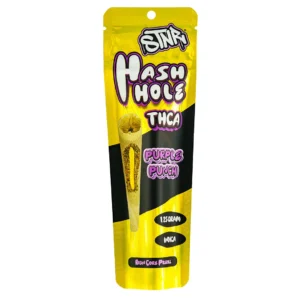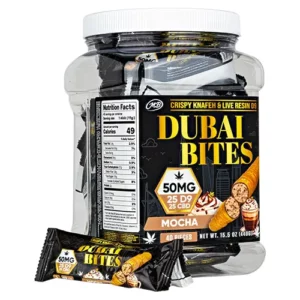Ever wondered about the mysterious journey of THCA through your body? You’re not alone. As cannabis laws evolve and its use becomes more widespread, understanding how long THCA lingers in your system is crucial. Whether you’re a casual user, a medical patient, or just curious, this guide will unravel the complexities of THCA retention and its implications. Buckle up as we dive into the science, bust myths, and provide practical insights that could make a world of difference in your cannabis experience.
The Science of THCA in the Human Body
THCA, or tetrahydrocannabinolic acid, is the non-psychoactive precursor to THC found in raw cannabis plants. It’s like THC’s shy cousin who doesn’t like to party. But don’t be fooled by its laid-back nature – THCA plays a significant role in how cannabis interacts with our bodies.
When cannabis is consumed, THCA undergoes a transformation. Heat from smoking, vaping, or cooking converts THCA into THC, the compound responsible for the “high” associated with cannabis use. This process, known as decarboxylation, is crucial for understanding how THCA behaves in our system.
Once THCA is converted to THC and enters the bloodstream, it’s metabolized by the liver. The liver breaks down THC into various metabolites, including 11-hydroxy-THC and THC-COOH. These metabolites are what drug tests typically look for, not THCA itself.
The precise amount of time it takes for THCA to leave your body is unknown due to limited research on the elimination of THCA specifically. This gap in scientific knowledge makes it challenging to provide exact timelines for THCA clearance. However, we can make educated guesses based on what we know about THC metabolism.
The body’s fat cells play a significant role in storing THC metabolites. Unlike water-soluble substances that are quickly flushed out, THC and its byproducts are lipid-soluble, meaning they can hang out in your fat cells for extended periods. This is why THC can build up in the body over time, especially with regular use.
Understanding this science is crucial for anyone concerned about thc build up in body or wondering why does thc stay in your body for so long. It’s not just about how much or how often you consume cannabis – your body’s unique physiology also plays a starring role in this biological drama.
Comparative Analysis of THCA and THC: Legal Status and Psychoactive Properties
When it comes to cannabis compounds, THCA and THC are like fraternal twins – related but distinctly different. Understanding these differences is crucial, especially when considering their legal status and effects on the body. Let’s dive into a comparison that might just blow your mind (pun intended).
First off, let’s tackle the burning question: will THCA show up on a drug test? The short answer is, it’s complicated. While THCA itself isn’t typically what drug tests look for, the conversion of THCA to THC in your body can lead to positive results. So, if you’re wondering will THCA show up in a drug test, the answer is that it might – indirectly.
Now, let’s talk legal status. THCA exists in a bit of a gray area. In many places, THCA is not explicitly illegal because it’s non-psychoactive. It’s the raw, unheated form found in cannabis plants. THC, on the other hand, is the bad boy of the cannabis world – it’s psychoactive and often strictly regulated or illegal.
Speaking of psychoactive properties, this is where THCA and THC really part ways. THCA, in its raw form, won’t get you high. It’s like having a uncooked cake mix – the potential is there, but it needs heat to transform. THC, however, is the life of the party. It’s responsible for the euphoria, altered perception, and other effects associated with cannabis use.
The conversion process from THCA to THC is fascinating. It happens through decarboxylation – a fancy term for applying heat. This is why eating raw cannabis won’t get you high, but smoking or baking it will. It’s like THCA is Clark Kent, and heat is the phone booth that turns it into Superman (THC).
Legally speaking, this distinction is crucial. Some products high in THCA but low in THC might be legal in areas where THC is not. However, the potential for THCA to convert to THC complicates matters. It’s like having a legal firework that becomes illegal once you light it.
In terms of medical applications, both compounds show promise. THCA is being studied for potential anti-inflammatory and neuroprotective properties. THC, meanwhile, is already used for pain relief, nausea control, and appetite stimulation. It’s like comparing a Swiss Army knife to a specialized tool – both have their unique uses.
Understanding these differences is key for anyone using or considering using cannabis products. Whether you’re concerned about drug tests, legal implications, or just curious about the science, knowing the THCA-THC relationship is crucial. It’s a bit like being a cannabis connoisseur – the more you know, the better equipped you are to make informed decisions.
Detection Windows for THCA in Various Drug Tests
When it comes to thc drug test scenarios, understanding the detection windows for THCA in different types of tests is crucial. These windows can vary significantly depending on the test type, frequency of use, and individual factors. Let’s break down the detection times for various drug tests and explore why they differ.
Urine tests are the most common form of thc urine test, and they have a surprisingly wide detection window. Urine drug tests can detect THCA metabolites for up to 45 days, but this time frame can vary depending on usage frequency, dosage, metabolism, and other biological factors. This extended detection period is why many people are concerned about thc detection times in urine.
To give you a clearer picture, here’s a simplified thc detection times in urine chart:
- Occasional users (1-2 times per week): 3-7 days
- Moderate users (3-4 times per week): 5-14 days
- Heavy users (daily): 10-30 days
- Chronic heavy users: Up to 45 days
It’s important to note that thc urine test accuracy can vary. Factors like hydration levels, time of day, and even certain foods can influence results. The thc urine test window is generally considered reliable, but it’s not infallible.
Blood tests, on the other hand, have a much shorter detection window. Blood tests typically detect THCA metabolites for up to 24 hours, but this duration can be affected by usage and metabolism. This makes blood tests more suitable for detecting recent use rather than historical consumption.
Saliva tests are becoming increasingly popular due to their non-invasive nature. Saliva tests can detect THC metabolites for up to 48 hours, with the detection window influenced by metabolism and dosage. These tests are often used in roadside drug testing but are less common in workplace scenarios.
For those concerned about long-term detection, hair tests are the most daunting. Hair tests can detect THCA use for up to 90 days, with hair growth also affecting the detection window. This extended window makes hair tests particularly challenging for regular users to pass.
Understanding these detection windows is crucial for anyone who might be subject to drug testing. Whether you’re a medical cannabis user, a recreational consumer, or simply curious about the science, knowing how long THCA and its metabolites linger in your system can help you make informed decisions.
Remember, these detection times are general guidelines. Individual factors like metabolism, body fat percentage, and hydration levels can all influence how long THCA stays in your system. It’s always best to err on the side of caution when it comes to drug testing, especially if your job or legal status depends on it.
Key Factors Influencing Detection Times
When it comes to understanding how long THCA and THC stay in your system, it’s not a one-size-fits-all scenario. Various factors play crucial roles in determining detection times, and being aware of these can help you better understand your situation. Let’s dive into the key elements that influence how long these compounds linger in your body.
Metabolism is a significant player in this game. Your body’s metabolic rate affects how quickly it processes and eliminates substances, including THCA and THC. This is why the question of how long does thc stay in urine overweight individuals is particularly relevant. People with higher body fat percentages tend to retain THC metabolites longer because these compounds are lipid-soluble, meaning they bind to fat cells.
The frequency and amount of cannabis use also significantly impact detection times. THCA can linger in your system for a few hours to several days, depending on factors like metabolism, body fat, and usage frequency. For instance, single use thc detection might show up for only a few days, while regular users may test positive for weeks after their last use.
Understanding the half-life of thc in urine is crucial for predicting detection times. The half-life refers to the time it takes for half of the substance to be eliminated from the body. THC’s half-life can vary widely, ranging from 1-10 days, depending on usage patterns and individual factors.
Hydration levels play a role in THC clearance urine rates. While drinking excessive water won’t magically clear THC from your system, proper hydration can help maintain normal metabolic functions, potentially aiding in the natural elimination process.
Here’s a list of other factors that can influence detection times:
- Age: Older individuals may have slower metabolisms, potentially extending detection times.
- Gender: Due to differences in body fat composition, THC may be detectable longer in females than males.
- Exercise: Physical activity can temporarily increase THC levels in the bloodstream as fat cells break down.
- Diet: A high-fiber diet may help increase THC elimination through feces.
- Potency of cannabis: Higher THC concentrations can lead to longer detection times.
It’s important to note that while these factors can influence detection times, they don’t guarantee a specific outcome. The interplay between these elements is complex and can vary from person to person. For instance, an overweight individual who rarely uses cannabis might clear THC faster than a slim, chronic user.
Understanding these factors is crucial for anyone concerned about drug testing or simply curious about how their body processes cannabis compounds. It’s a reminder that our bodies are unique, and generalizations about detection times should be taken with a grain of salt. Whether you’re a medical cannabis patient, a recreational user, or just interested in the science, knowing these influencing factors can help you make more informed decisions about cannabis use and potential testing scenarios.
The Duration of THCA in Different User Scenarios
When it comes to cannabis use, one of the most common questions is how long does one joint stay in your system. The answer, like many aspects of cannabis consumption, isn’t straightforward and can vary significantly depending on the user’s habits and physiology. Let’s break down different scenarios to give you a clearer picture.
For the occasional smoker, the duration of THCA in the system is relatively short. Urine drug tests may show THCA for approximately 1-2 days after use, with the detection window potentially longer for regular users. This means if you’re wondering about weed detection in urine after smoking a single joint, you might be in the clear after a couple of days, assuming you’re not a frequent user.
However, for regular users, the story changes. The accumulation of THC metabolites in the body means that frequent smokers might test positive for much longer periods. In these cases, THCA and its metabolites could be detectable for weeks after the last use, especially in urine tests.
When considering how long does THC stay in your blood, the window is typically shorter than urine tests. Blood tests usually detect THC for up to 36 hours after use in occasional users. However, for chronic users, THC might be detectable in blood for several days or even weeks.
Let’s look at some specific scenarios:
- The Weekend Warrior: Someone who smokes a joint or two on weekends might test positive on a urine test for 3-5 days after use.
- The Daily User: A person who consumes cannabis daily could test positive for 30 days or more after their last use, especially in urine tests.
- The Medical Patient: Regular medical cannabis users might have detectable levels of THC in their system for extended periods, potentially months after cessation.
- The One-Time Experimenter: A first-time user who tries a single joint might clear a urine test within 3-4 days, though individual factors can influence this.
- The Edible Enthusiast: Consuming cannabis through edibles can lead to longer detection times due to the way THC is metabolized when ingested orally.
It’s crucial to remember that these are general guidelines. Factors like body mass index, metabolism rate, and the potency of the cannabis consumed all play roles in how long THCA and THC remain detectable.
For those concerned about drug testing, it’s important to note that different types of tests have varying sensitivity levels. While a blood test might come back negative after a few days, a hair follicle test could detect cannabis use for months after the last consumption.
Understanding these different scenarios can help users make informed decisions about their cannabis consumption, especially if they’re subject to drug testing for work or legal reasons. It’s always better to err on the side of caution and allow more time than you think you might need if you’re trying to clear your system of THC.
Remember, the only surefire way to pass a drug test is to abstain from cannabis use. If you’re a medical patient, it’s worth discussing your situation with your healthcare provider or employer to understand your options and rights.
Methods to Reduce Detection Times
If you’re wondering how to get THCA out of your system or looking for ways to clear THC, you’re not alone. While there’s no magic bullet to instantly remove these compounds from your body, there are several methods that might help speed up the process. Let’s dive into some strategies that could potentially reduce detection times.
First and foremost, it’s crucial to understand that the most effective way to clear THC from your system is to stop consuming cannabis and allow your body to naturally eliminate it. However, if you’re in a time crunch, here are some approaches that might help:
- Hydration is Key: Drinking plenty of water can help flush your system and potentially speed up the elimination of THC metabolites. While it won’t work miracles, staying well-hydrated is always a good idea for overall health and might assist in the natural detox process.
- Exercise Regularly: Physical activity can help burn fat cells where THC metabolites are stored. However, be cautious about exercising too close to a drug test, as it might temporarily increase THC levels in your bloodstream.
- Eat a Healthy Diet: Consuming foods high in fiber can help increase bowel movements, which may aid in eliminating THC metabolites. Lean proteins and vegetables are also beneficial for overall detoxification.
- Try Natural Diuretics: Beverages like cranberry juice, green tea, and lemon water are natural diuretics that might help flush your system. However, their effectiveness in specifically targeting THC is not scientifically proven.
- Consider Detox Products: There are numerous detox products on the market claiming to help clear THC. While some users report success, it’s important to approach these with caution and do thorough research before use.
When it comes to how to remove THC from blood and urine, it’s important to note that there’s no guaranteed method to completely eliminate THC metabolites instantly. The body needs time to process and excrete these compounds naturally.
Here are some additional tips that might help:
- Avoid fatty foods: THC is fat-soluble, so reducing fat intake might help minimize THC absorption and storage.
- Sweat it out: Saunas or hot baths might help you sweat out toxins, including THC metabolites.
- Get enough sleep: Adequate rest supports your body’s natural detoxification processes.
It’s crucial to remember that while these methods might help, they’re not foolproof. The effectiveness can vary greatly depending on factors like your body composition, metabolism, and frequency of cannabis use.
Also, be wary of extreme methods or products that promise instant results. Some of these can be harmful to your health or even alter test results in ways that raise suspicion.
If you’re facing a drug test and concerned about THC detection, the safest approach is to be honest with the testing authority if possible. Many organizations have policies in place for medical cannabis users or may be willing to work with you if you’re upfront about your situation.
Remember, the only guaranteed way to clear THC from your system is time and abstinence. While these methods might help speed up the process, they’re not magic solutions. Always prioritize your health and well-being over quick fixes, and consult with a healthcare professional if you have concerns about cannabis use and drug testing.
Legal Implications and Misconceptions about Consuming THCA
When it comes to THCA, the legal landscape is as hazy as a smoke-filled room. Many people assume that because THCA is non-psychoactive, it’s automatically legal. But let’s clear the air on this misconception and dive into the legal implications of consuming THCA.
First off, it’s crucial to understand that while THCA itself doesn’t get you high, it readily converts to THC when heated. This transformation is at the heart of many legal debates. In some jurisdictions, THCA is treated the same as THC under the law, regardless of its non-psychoactive nature in its raw form.
One common misconception is that consuming raw cannabis or THCA-rich products is a legal loophole. Sorry to burst your bubble, but it’s not that simple. While raw cannabis might not get you high, many laws don’t distinguish between THCA and THC. This means you could potentially face legal consequences even if you’re munching on raw cannabis leaves like they’re kale chips.
Another widespread myth is that THCA won’t show up on drug tests. While it’s true that drug tests typically look for THC metabolites, remember that THCA can convert to THC in your body. So, consuming THCA-rich products could still lead to a positive drug test result. It’s not a get-out-of-jail-free card for drug screenings.
The legal status of THCA also varies wildly depending on where you are. In some states where cannabis is legal, THCA is treated the same as any other cannabis product. In others, there might be specific regulations around THCA content. And in places where cannabis is still illegal? You guessed it – THCA is usually a no-go too.
It’s also worth noting that the legal landscape is constantly evolving. What’s legal today might not be tomorrow, and vice versa. This fluid situation makes it crucial to stay informed about local laws and regulations.
For medical users, there’s an additional layer of complexity. While some states have provisions for medical cannabis use, these don’t always explicitly cover THCA. It’s essential for medical users to understand exactly what their prescriptions or recommendations cover.
Here’s a quick rundown of key points to remember:
- THCA’s legal status often mirrors that of THC, despite its non-psychoactive nature.
- Consuming raw cannabis or THCA-rich products isn’t a foolproof legal workaround.
- Drug tests can potentially pick up THCA consumption through its conversion to THC.
- Legal status varies by location and is subject to change.
- Medical users should clarify the specifics of their cannabis recommendations.
The bottom line? Don’t assume THCA is a legal free-for-all. Always do your homework on local laws and regulations. And remember, just because something is natural doesn’t mean it’s legal or consequence-free.
As we navigate this complex legal terrain, it’s crucial to stay informed and make responsible choices. Whether you’re a curious newcomer or a seasoned cannabis enthusiast, understanding the legal implications of THCA consumption is key to staying on the right side of the law while exploring its potential benefits.
Practical Advice for Individuals Concerned About Drug Testing
Drug testing is a common concern for many cannabis users, whether for employment, legal, or personal reasons. Understanding how cannabis compounds like THCA and THC are detected in various tests can help individuals make informed decisions.
Urine tests are the most common form of drug screening. Many people wonder, does weed show up in a physical urine test? The answer is yes, it can. THCA itself doesn’t stay in your urine for long, especially compared to THC metabolites, but the duration can be influenced by usage frequency and metabolism. This means that even if you’ve only consumed THCA, there’s a possibility it could convert to THC in your body and show up on a test.
For those asking will thc show on urine test, the answer is typically yes. THC metabolites can be detected in urine for varying periods, depending on usage patterns and individual factors. Occasional users might test positive for a few days, while heavy users could test positive for weeks after their last use.
Blood tests are more suited for detecting recent drug use, and THCA is less likely to remain in your bloodstream for long durations. This type of test is often used in situations where recent impairment needs to be assessed, such as in cases of driving under the influence.
Saliva tests are also known for detecting recent drug use, often within a few hours of consumption, and THCA’s presence in saliva is typically transient. These tests are becoming more popular due to their non-invasive nature and ability to detect very recent use.
Here’s some practical advice for those concerned about drug testing:
- Abstinence is the most reliable method to pass a drug test. If you know a test is coming up, stopping cannabis use as early as possible is your best bet.
- Be aware of your consumption patterns. Occasional use is generally detectable for shorter periods compared to regular, heavy use.
- Stay hydrated. While drinking water won’t eliminate THC from your system, proper hydration supports your body’s natural detoxification processes.
- Exercise regularly, but be cautious about working out right before a test. Exercise can help burn fat cells where THC is stored, but it might temporarily increase THC levels in your bloodstream.
- Be honest if possible. If you’re a medical cannabis user, discuss your situation with your employer or the testing authority. Many organizations have policies in place for such situations.
- Understand the limitations of detox products. While many products claim to help you pass drug tests, their effectiveness is not scientifically proven and some may be harmful.
- Consider the type of test you’ll be taking. Urine tests have longer detection windows than blood or saliva tests.
- Don’t rely on myths or unproven methods to beat drug tests. Many of these can be ineffective or even dangerous.
Remember, the information provided here is for educational purposes only. The most reliable way to pass a drug test is to abstain from cannabis use. If you have concerns about drug testing, it’s advisable to consult with a healthcare professional or legal expert for personalized advice.
Frequently Asked Questions
Will 2 hits of 97% THC be in your system in 10 days?
The detection of THC in your system after 10 days from consuming 2 hits of 97% THC depends on various factors. For infrequent users, THC metabolites are typically undetectable in urine after 3-7 days. However, the high potency (97% THC) could potentially extend this window. Factors such as metabolism, body fat percentage, and hydration levels also play a role. While it’s possible that THC might clear your system within 10 days, it’s not guaranteed, especially if you’re a regular user or have a slower metabolism.
How long can 1 hit of THC stay in my system?
A single hit of THC can remain detectable in your system for varying periods depending on the test type and individual factors. In urine, it might be detectable for 3-7 days for infrequent users. Blood tests can detect THC for up to 24-48 hours after use. Saliva tests may show positive results for 24-72 hours. Hair follicle tests can detect THC for up to 90 days, even from a single use. However, these are general estimates, and individual results can vary based on factors like metabolism, body composition, and the potency of the THC consumed.
Will THC show up in urine drug tests?
Yes, will thc show up in urine drug tests is a common concern, and the answer is affirmative. Urine tests are designed to detect THC-COOH, a metabolite of THC, which can remain in the system long after the effects of THC have worn off. The detection window can range from a few days for occasional users to several weeks for heavy, chronic users. It’s important to note that even products marketed as containing only CBD might contain trace amounts of THC, which could potentially lead to a positive test result.
How far back does a 10 panel urine test go?
A 10 panel urine test typically detects drug use within the following timeframes:
- Marijuana (THC): 3-30 days, depending on usage frequency
- Cocaine: 2-4 days
- Amphetamines/Methamphetamines: 2-5 days
- Opiates (e.g., heroin, codeine): 2-5 days
- Phencyclidine (PCP): 3-7 days
- Benzodiazepines: Up to 7 days for therapeutic use, longer for chronic use
- Barbiturates: 2-10 days, depending on the specific drug
- Methadone: 2-7 days
- Propoxyphene: 1-2 days
- MDMA (Ecstasy): 2-4 days
These timeframes are approximate and can vary based on factors such as drug potency, frequency of use, metabolism, and hydration levels. For THC specifically, the detection window can be longer for chronic users, potentially up to 30 days or more in some cases. It’s important to note that while a 10 panel test covers a wide range of substances, it doesn’t detect all possible drugs, and additional specialized tests may be required for certain substances.
Conclusion and Final Thoughts
As we wrap up our deep dive into the world of THCA and its detection in the human body, it’s clear that this topic is as complex as it is fascinating. The journey of THCA through our system is influenced by a myriad of factors, from individual physiology to consumption patterns, making it a challenging subject to pin down with absolute certainty.
Throughout this article, we’ve explored the science behind THCA, its relationship with THC, and the various detection methods used in drug testing. We’ve seen that while THCA itself is non-psychoactive, its potential to convert to THC raises important legal and practical considerations for users.
Key takeaways include:
- The duration of THCA in your system can vary widely based on factors like metabolism, body composition, and frequency of use.
- Different drug tests have varying detection windows, with urine tests generally having the longest detection period.
- Legal implications of THCA consumption are complex and often mirror those of THC, despite THCA’s non-psychoactive nature.
- While there are methods that might help reduce detection times, there’s no guaranteed way to quickly clear THCA or THC from your system.
For those concerned about drug testing, it’s crucial to understand that abstinence remains the most reliable method to ensure a negative result. However, for medical users or those in areas where cannabis is legal, open communication with employers or relevant authorities about cannabis use can often lead to more understanding and accommodating policies.
As research in this field continues to evolve, we may see more nuanced approaches to testing and regulation that better distinguish between THCA and THC. Until then, staying informed about local laws, understanding your own consumption patterns, and making responsible choices are key to navigating the complex landscape of cannabis use and testing.
Remember, while this article provides a comprehensive overview, it’s not a substitute for professional medical or legal advice. Always consult with healthcare providers or legal experts for personalized guidance, especially when it comes to matters that could affect your health or legal standing.
As we continue to unravel the mysteries of cannabis compounds like THCA, one thing remains clear: knowledge is power. By staying informed and approaching cannabis use thoughtfully, we can make more educated decisions about our health, wellness, and legal compliance in an ever-changing landscape.










